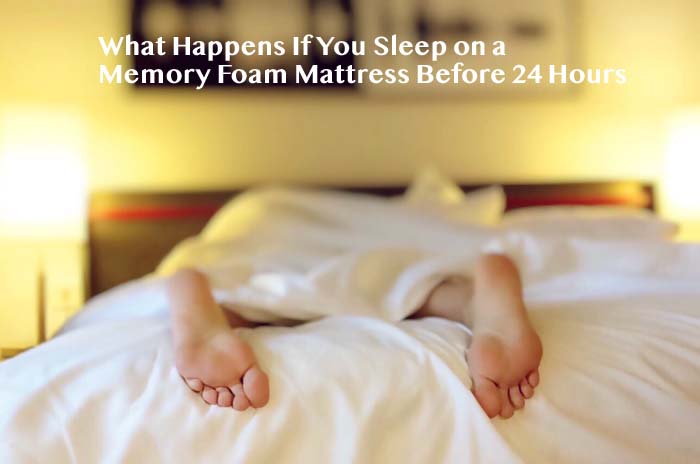What Happens If You Sleep on a Memory Foam Mattress Before 24 Hours
by | Last Updated
So, you’ve bought your new mattress-in-a-box from one of those fancy online brands. And you’ve probably been told that you need to wait at least 24 hours after unboxing before you can sleep on your new bed.
The thing is, these beds are shipped compressed, so they may need up to 72 hours or even more to fully expand.
But what will happen if you sleep on a memory foam mattress before 24 hours?
The short answer is:
Nothing much, actually.
But there are a few not-so-great scenarios that might negatively affect either you or your bed. I will share them below along with some preventive tips.
A Quick Links
What Happens If You Sleep on a Memory Foam Mattress Before 24 Hours: Possible Problems
So, let’s begin with a little disclaimer:
Today, most high-quality memory foam mattresses are made of more durable materials than years ago, so you can actually sleep on your new bed a few hours after it’s installed onto your bed frame. It won’t impact its lifespan or supportive properties.
The issues I’ve listed below apply to cheaper beds that are made from low-quality foams. But it’s still helpful to know about them so that you’d be prepared, right?
Here they are.
Your Mattress May Not Decompress Properly
You know what happens after you remove the vacuum-sealed film — your mattress starts to expand like insane. It will regain volume so that it can offer you the support you need. And obviously, the longer this process lasts, the thicker and more cradling your mattress will become at the end.
Now, I will again refer to cheaper beds.
These beds typically are made with the use of first-generation viscoelastic foam. This material has less rebound compared to modern materials. So yes, they might need more time to expand completely. And if you fall asleep on this mattress before 24 hours have passed, you may feel that your bed is a bit flat, which may result in morning pain and stiffness.
“If your mattress hasn’t decompressed completely within a week, chances are it’s due to a manufacturing defect. In this case, you should contact customer support and discuss a refund or replacement.”
Odor Concerns
The second possible issue may strike you regardless of the price tag of your mattress (although cheaper beds without proper certifications can be more harmful).
Now, any foam is a result of a chemical reaction that involves a lot of ingredients, and some of them may emit sharp odors, so the end product is likely to have an odor too.
When your new mattress starts to expand, the air penetrates the pores of memory foam and pushes out the volatile organic compounds. That’s why new mattresses may have that ‘factory’ smell.
If you’ve got a quality mattress, this odor will disappear rather fast, but this may still take a day or two. Thus, if you choose to sleep on your memory foam mattress before 24 hours without allowing it to air out, you may end up inhaling the VOCs and feeling that chemical smell.
Again, if your mattress is made of quality, certified materials, this won’t do you any harm. But odor-sensitive individuals might get a headache or other unpleasant symptoms.
“You can speed up the release of volatile compounds by putting pressure onto your mattress with your hands. Or, you can allow your kids to jump on it for a little while.”
Is It True For All Memory Foam Beds?
As I’ve already said, most mattress brands today use quality materials, meaning their mattresses don’t have harmful components inside.
It’s quite uncommon for a mattress to stay flat after a week. In most cases, your bed will be ready to accommodate you in 12-15 hours after unboxing.
To ensure that you’re getting a bed that won’t fail you, here are some recommendations to follow:
- Choose trusted brands. Look for brands with a successful history on the market and check out reviews written by real users or niche experts.
- Look for certification labels. While this may not save you from odors, at least you will be sure about the absence of harmful chemicals and cheap-made foams.
- Make the most of your trial period. Companies selling online compensate you for the inability to test a mattress with long trial periods. Never hesitate to return the product that didn’t meet your needs.
“Note that some companies require you to go through a mandatory break-in period, which usually lasts 30 days, before allowing you to claim a return or replacement.”
Bonus Tips: How to Prepare Your Mattress So That You Could Sleep On It on the Day You’ve Bought It
Finally, I want to share with you some tips I use before testing any new bed. With these recommendations, you can start sleeping on any memory foam mattress before 24 hours have passed and still feel comfortable.
Here’s what you need to do:
- Treat your mattress with fresh air. To help your mattress decompress faster, allow for proper air circulation around it. After unboxing, I usually open all the windows in my bedroom or turn on the AC for a few hours.
- Add some heat. Excessive aeration during winter months isn’t a great idea. The thing is, you can use heat as well. Heat makes memory foam expand faster, and your mattress will be totally ready by the moment you decide you want to sleep. Just don’t put the heater too close to the bed, or else it may ruin it.
- Use scents. If the mattress odor is too strong for you, try using scents. I prefer peppermint oil because it can absorb other odors pretty well while being unobtrusive.
- Put a mattress protector on. Finally, if your mattress has completely expanded, but you can’t stand the odor, use a mattress protector. Waterproof encasements will not only enclose any odors inside but also prevent your mattress from getting stained.
So, are you still going to follow the 24-hour rule with your new mattress, or are you thinking of breaking it this time? Have you encountered any issues I’ve mentioned above? Share your stories in the comments!





No Comments